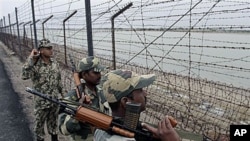The year 2010 in South Asia was mostly dominated by the political agenda between India and Pakistan. It was marked by attempts by both sides to revive a peace process that began in 2004, but stalled four years later because of a terrorist attack in India's financial hub of Mumbai.
The effort lost its momentum this summer as India reportedly wanted to start with a narrow agenda of security and terrorism issues, while Pakistan called for broader talks to include the disputed territory of Kashmir.
Longtime observers of South Asian affairs in Washington say the next year in that region again will depend on how fast India and Pakistan can end the impasse in their peace process. They say the key to overcome the stalemate lies in their economic relations.
The stalemate was triggered by the terror attack in Mumbai in 2008 that exposed weaknesses of India's homeland security system. And it lingers now because of what India maintains is Pakistan's slow pace in punishing the culprits who belong to Pakistan-based militant group, Lashkar-e-Taiba.
The peace process began in 2004 when the military president General Pervez Musharraf was still in power. Just before he resigned in 2008, Musharraf said he was very close to establishing peace with India through an agreement over the long-standing Kashmir dispute.
"We were proceeding reasonably, fast in fact," said Musharraf. "We had worked out the parameters and we were drafting an agreement. I think it is a pity that we could not reach conclusions. Fleeting moments come in the lives of the leaders and countries, and the key to success is to grasp the fleeting moments."
General Musharraf had banned the Lashkar group, but its leaders later changed the name of their group twice, allegedly to operate under cover as charity groups.
India has said it is not interested in reviving the peace process now until Pakistan dismantles anti-Indian terror groups operating from its soil and punishes the militant leaders involved in the Mumbai terror attack. Pakistan says it wants more evidence to punish them, and India has alleged that is just a stalling tactic.
But senior Pakistani analyst Ikram Sehgal said India should expand its economic relations with Pakistan, as it did with China despite the ongoing border disputes. "Yet it moved to establish those economic links [with China], which ultimately will translate into political links," said Sehgal. "I think that is what we expect from India."
Shuja Nawaz heads the South Asia program at the Atlantic Council in Washington. He also said the key to improving relations between India and Pakistan lies in improving economic relations. "Pakistan has a shrinking economic pie and India has a growing economic pie. Pakistan does not have a unified approach. There is a divide in the civilian (government) and the military. They need to see the advantage in growing the economic pie in Pakistan, and the best and the only way that is currently available is trade with India," said Nawaz.
Trade between the two neighbors in 2009 was less than $2 billion, and an agreement over giving "the most favored nation status" to each other in trade is still pending. But annual potential trade volumes between the two nations have been estimated by various trade associations at between $6 billion to $10 billion.
Nawaz said economic relations between the two countries are not growing because in Pakistan, the Army has been resisting the civilian government's efforts.
"There needs to be an effort at the highest level," said Nawaz. "In Pakistan's case it means involving the leadership of the military in the way the military has been involved in the strategic dialogue with the United States."
The experts say they hope the two archrivals will break the impasse in 2011 by expanding their trade relations because the overall economic agenda in South Asia mostly depends on the status of their relations.
Experts: South Asia's 2011 Agenda Depends on India/Pakistan Relations




